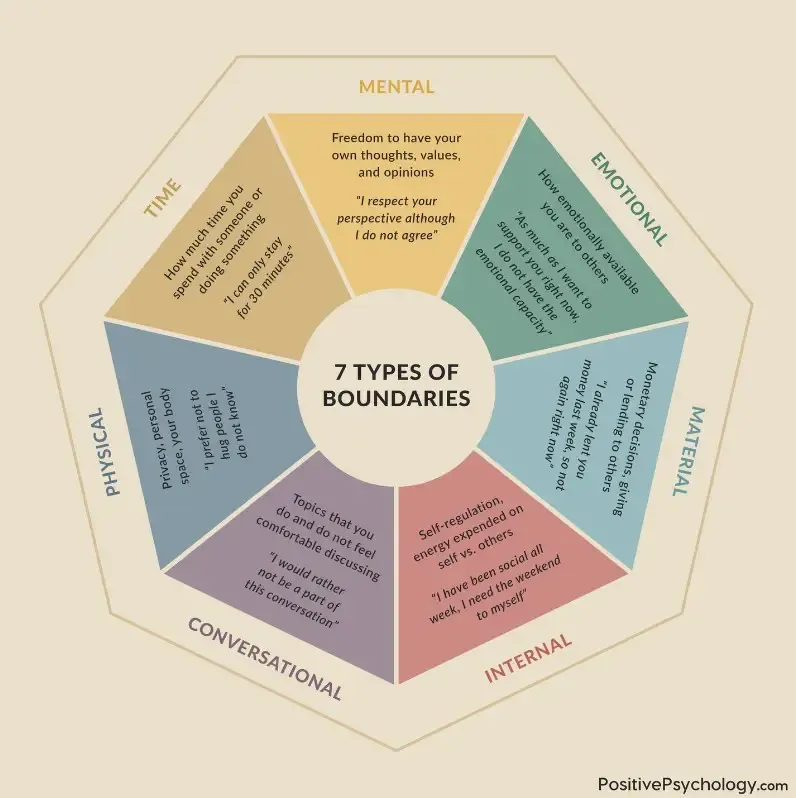Boundaries During the Holidays
With the holidays and fun comes some hurdles for a lot of us- boundaries.
Boundaries are those things you set verbally, and physically to help protect yourself and your wellness. Boundaries can be misrepresented so we see it defined by University of California, Berkeley as, “…the limits and rules we set for ourselves within relationships. A person with healthy boundaries can say “no” to others when they want to, but they are also comfortable opening themselves up to intimacy and close relationships.”
As this Positive Psychology graphic displays, there are many different types and reasons for us to set boundaries. And I bet if you took the time, you could find an example for each type of boundary for the holiday season.
Before we get into tips, we need to define what boundary breakers are- in the general sense, a person who disregards or does not acknowledge/listen to the boundaries you set are boundary breakers. Sometimes they might try to gaslight you and your boundary, such as, “You are so sensitive, it was just a joke.” For more examples of different types and contexts of gaslighting, check out this Very Well Mind article. Keep in mind, gaslighting is not the same as having a difference of opinion, if someone is trying to gaslight you they are trying to twist or change the truth and facts. If someone has a difference of opinion it is not about changing the truth, it is about having different views or perceptions of reality.
So What Tips Can Create a Boundary Filled Holiday?
Create a Game plan: if you are seeing people that you know may be boundary breakers or disregard certain boundaries you set then it can be helpful to create a “game plan” of if or when that happens. Will you stay? Will you exit? Will you try to share how that makes you feel? Checking in with your therapist can also bring out personalized ways to navigate this.
Be clear: When you feel safe to verbally share your boundaries, be clear about what you need. This allows for less space to create misunderstanding or boundary violations over and over again (if the person listening is validating and supportive of course).
Be realistic: Some people, we know are not going to change or are too far away from change to create any middle ground with. If you are around people like this for the season, be realistic about what is your goal while you are interacting with them? Maybe it is unrealistic to think you both will get to a middle ground or that they will adopt your view on something.
Remember your physical boundaries: You can be like the couple in Four Christmases and create your own holiday season if you wish! There is no rulebook on how we live our lives, we are just making the best calls we can. If you are debating whether to go at all, it might be a good topic to process and talk through with your therapist.
Look at it externally: A good example of this tip is grieving during the holidays. Some people may have a different religious view than you do, and may try to say words of comfort that you don’t find helpful or may even feel are harmful to your own views. Check in with yourself if you wish to share a phrase you prefer, or want to let it go. Reflecting on, “is this really about me or them?” can be a helpful externalization question to ask yourself before you respond. Obviously this blog is vague- so remember that these generalities are thought-points to think and reflect on.
You got this!
Please remember that we keep tips and ideas for prompts vague and brief because deeper thought points are done in the personalized space of private therapy. All our posts are meant to help provide ideas, but are not clinically direct advice. If you are looking for a therapist to create boundaries for yourself, contact us here!


